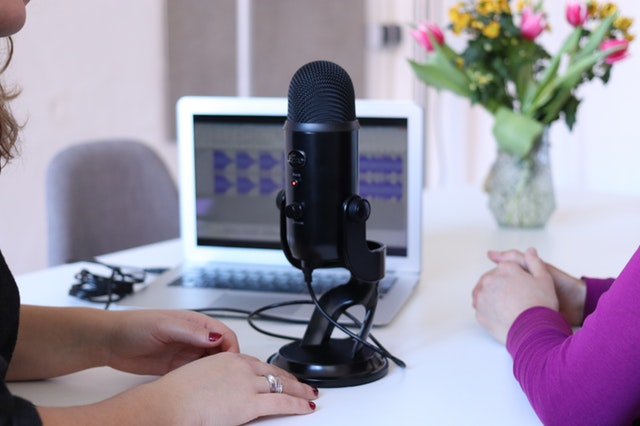So you want to start a podcast. However, you are worried because you do not know where to begin and may be concerned that you are not “techy enough” to pull it off. Isn’t podcasting super complicated? Let’s dive into how to start a podcast.
One of the biggest misconceptions about starting a podcast is that you have to have an audio engineering degree. Or that you have to have the latest and greatest equipment, and know all the technical lingo.
I am not a super techy person and I work in the podcasting space full time. Hopefully that encourages you that if I can do it…you can too.
The number one thing that you “need” to start a podcast is the resolve to start one. Everything is “figureoutable” including gear, tech, and RSS feeds. I promise.
I hope through this post, to demystify some of the technical blocks that keep people from hitting “publish” on their show. It will hopefully encourage you that if hosting a podcast is of interest to you, you should give it a shot.
You never know, you might love it, and it might just change your life.
Forming your show’s concept
Looking back, one of the things that I wish I would have spent more time on was forming my show’s concept. I knew that I wanted to talk about leadership but how was I REALLY different from all the other shows on leadership?
Let me give you an example. Let’s say you want to start a marketing podcast. How will your show stand out from the rest? Can you explain in a few seconds the core philosophy of your show and what listeners will gain by listening to YOU?
When someone sees YOUR marketing podcast will they know immediately if it’s for them or not? Is it for women and men? Is it for beginner marketers or advanced? How is what you teach different from other marketing shows right next to it in iTunes?
Now when you start to dig in and research what is already being done do NOT become discouraged. The fact that there are other shows like the one you want to start is a great thing, it means that there is a market for it. Don’t allow fear to set in and think, “There is nothing special about my podcast. My industry is oversaturated. I do not need to start a show.”
This honestly is just a bad mindset. There are leaders who I ADORE (and follow all of their work) and I have friends who have NEVER heard of them. If leaders with HUGE audiences still have yet to reach everyone, there is surely plenty of listeners to go around.
If you struggle with separating yourself from other shows ask yourself, “What do I wish existed a few years ago that I did not have access to?” or “How can I add more of my story or personality into this show?”. We are all unique so do not be afraid to add more of YOU in your show to separate you from the crowd.
The break down when thinking about how to start a podcast
To simplify podcasting for you here are the most basic of steps. Of course, you can dig and learn/implement many more details to this process, but technically this is all you need to get started.
First, you need your audio, then you need to submit that audio to your “feed”, then that feed updates all the directories (iTunes, Spotify, Stitcher, etc). That’s really it. Not as bad as you thought, huh!?
Audio
Seriously, you honestly do not need to spend tons of money on audio equipment. There are actually many people who record a podcast simply from their phones.
You technically only need a .mp3 recording of your voice (and that of your guest, if applicable). As for equipment, you can always start small and build. Buy something to get you started and upgrade when you can.
Same goes with editing your show. You can download a free program like Audacity and watch tutorial on Youtube on how to perform basic editing techniques to your file (adding an intro/outro or taking out filler words like “um, ya know, etc”)
Hosting site
There are many, many, many sites that can host your podcast. You need these sites to actually “house’ your show and give your podcast an RSS feed that you can submit to directories like iTunes, Spotify, Stitcher, etc.
These hosting sites range from free to only 30 or 40 bucks a month. Usually, they charge for more space (how big is your file?) and how detailed the analytics you receive are.
The simple idea behind hosting is that you only have to upload shows to one place and it does all the heavy lifting for you (hold your actual shows and distribute them to all the directories).
Submit to the directories
Once you have your audio, upload it to a hosting site, you take the RSS feed that the site creates for your show and submit it for (normally) free to a variety of major platforms. No, you do not have to continually update these platforms, they pull information from your RSS feed, so when your feed is updated (shows added, cover art changed, etc) your show will be updated too.
Every once in a while you have to go in and manually update your show on some of these platforms however that is very rare. Normally hosting sites like Libsyn allows you to update your show in all the places right there on their platform.
Wait, no. Shouldn’t there be more?
There IS more you need to consider when starting and growing your show. We could go into things like branding, distribution, whether you should have a website or not, etc. etc. However, these things can be figured out and tested as you get more comfortable with podcasting.
One of my favourite quotes is, “Action creates clarity.” and it’s true in podcasting too. Sometimes you don’t know “all the things” you should be doing until you simply START. When you have people listening, and you get more comfortable, it will become clear what you need to grow.
The real reason that’s holding you back isn’t that you don’t know how to start a podcast
I think what keeps people back more often than not from podcasting is the simple FEAR of starting. Often we make things more complicated than they are and allow perfection to keep us immobile from taking action.
No matter how much you plan, your podcast won’t be perfect. Even more, your podcast is probably going to change as you grow your show and “find your voice” podcasting.
Planning is GREAT and you should be clear on what kind of show you want to create and who it’s for (remember what we talked about with your show concept) but the actual tech side of your show is fairly simple. Remember that there is a natural learning curve to just about anything worthwhile and if you hang in there, producing your show will get easier and easier, I promise.
Let us know what questions you have and maybe we can answer them in upcoming posts!
 About the Author – HeatherParady
About the Author – HeatherParady
Heather is the host of The Unconventional Leaders Podcast. She interviews successful entrepreneurs who have overcome great adversity and built something great.




 About the Author –
About the Author –

